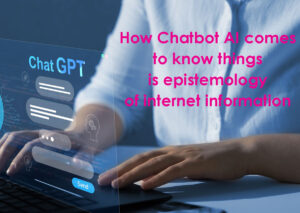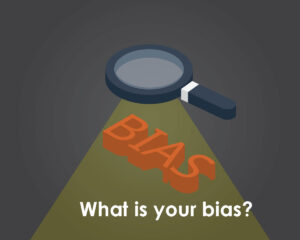The expansion of Chatbot synthetic intelligence (AI) improves entry and effectivity of acquiring details about well being and medical points that people are dealing with. Web web sites, weblog postings, social media platforms, and Chatbot AI searches are handy beginning factors for fast well being and medical info.
Nevertheless, how do we all know what you learn and listen to on-line is credible?
Epistemology is the research of data, or how we come to know issues.
How Chatbot AI involves know issues is the epistemology of web info.

How do we all know whether or not what we discover on-line is admittedly recognized?
When utilizing info, we should pay attention to the restrictions of know-how and use essential considering when evaluating the data.
We have to attain past, to do greater than learn, pay attention, and settle for that:
It is smart.
It suits with the best way I see the world.
I’m going with my intestine.
I heard it from a Guru.
Mother informed me.
This unquestioning manner of realizing is naive and harmful.
Generally, the data accessible on-line just isn’t excellent or dependable. These instruments can present deceptive info, misrepresent sources, or miss essential context.
Trusting info from a chatbot AI with out verification is like consuming water from a stream. It would look clear and refreshing, however you will not know if it is protected till you take a look at it.
What are the issues in easy methods to fact-check well being info from Chatbot AI, & web sources?

Who wrote/stated it?
Some AI platforms present citations, others require extra looking.
Go to the first supply and confirm info with out interpretation of the AI or the weblog poster.
Is there a couple of supply? Is the data corroborated by a number of dependable sources? Has the data undergone peer assessment?
Whether or not the data is from AI or social media influencers the factors ought to be evidence-based and patient-centered.
Who revealed/posted it?
Use dependable sources, authorities companies, medical organizations, and tutorial establishments.
The web area extension can present a clue relating to trustworthiness.
.edu web sites are instructional assets and are thought-about reliable. Nevertheless, the college doesn’t often monitor college students’ private Websites regardless that they’re on the college’s server and use the .edu area.
.gov web sites are government-affiliated are sometimes thought-about credible and have a tendency to offer citations listed with info.
.org web sites are advocacy or non-profit organizations. You could want to find out if the data from these sources has a bias.
.com web sites include some business facets. There’s a financial incentive behind each business website in offering you with info. They are often credible however remember to examine citations for any potential bias.
Peer-reviewed writing means it’s extra reliable. Dot com weblog postings usually are not peer-reviewed however can cite info from peer-reviewed info.
A majority of the citations within the PubMed database are peer-reviewed. Different databases might have a filter to checklist solely publications which are peer-reviewed. Along with looking PubMed utilizing key phrases for analysis or interventions, searches might be performed utilizing the writer’s identify. Checking to see if a social media influencer is listed in PubMed is a approach to assess their authenticity and credibility. Seek for the final identify adopted by first identify, no comma Howell Damien.
Does the data supplied have an agenda & bias?
Be cautious of bias and conflicts of curiosity.
Acknowledge web search engine algorithms can contribute to affirmation bias.
When confronted with uncertainty recognition of bias is essential.
If all you might have is a hammer the entire world seems like nails.

What’s your bias?
Pause, actively self-examine your personal private prejudice or preconceived notions, and actively search out various viewpoints of perspective to make sure you make knowledgeable selections.
Being offered with information suggesting our present beliefs are unsuitable is threatening. It’s troublesome to unlearn what our experiences might have informed us.
Is there another info that may be helpful?
The next are earlier weblog posts that discover consideration of the choice.
Search a session from a licensed healthcare skilled to research/assessment the data obtained.
Attain out for an expert evaluation. Telemedicine and digital medical data platforms, together with affected person portals and electronic mail, present alternatives to ask well being professionals questions.
Publications of peer-reviewed journal articles now present the e-mail addresses of the authors permitting dialogue.
“You recognize”
“You recognize” is the ever-present gap-filler or filler-word {that a} speaker makes use of as a second to pause and assume earlier than persevering with a sentence.
Should you say or while you hear “yada, yada, yada, yada, yada, yada,” why not truly take an extended pause than the word-filler of “.” Take a second and replicate do you or they actually know?
Ask how do you/they know?
The extra the extra you don’t know – Aristotle
The data on this web site just isn’t supposed or implied to be an alternative choice to skilled medical recommendation, analysis, or remedy. You’re inspired to carry out extra analysis relating to any info contained accessible via this web site with different sources and seek the advice of together with your doctor.
Damien Howell Bodily Remedy – 804-647-9499 – Fax: 866-879-8591 At-Residence, At Workplace, At Health Facility – I come to you, I do residence visits [email protected]
Source link



